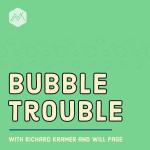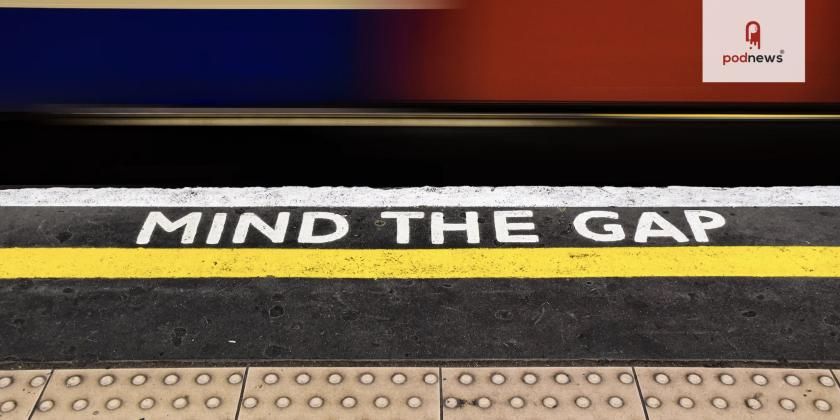
Mind the gap: why is all the podcast money in the US?

This article is at least a year old
This week, it’s the hundredth episode of the podcast that exposes financial misbehaviour, Bubble Trouble, hosted by Richard Kramer and Will Page and produced by Magnificent Noise. The hundredth show features an exclusive conversation with former Enron CFO Andy Fastow (pictured below, when they first met in 2015), the biggest bubbler troubler in corporate history; and to celebrate, Will Page wanted to help the podcast community make progress by dropping some economic truths for Podnews. The issue: why are podcast markets outside the US struggling to bring in revenue?
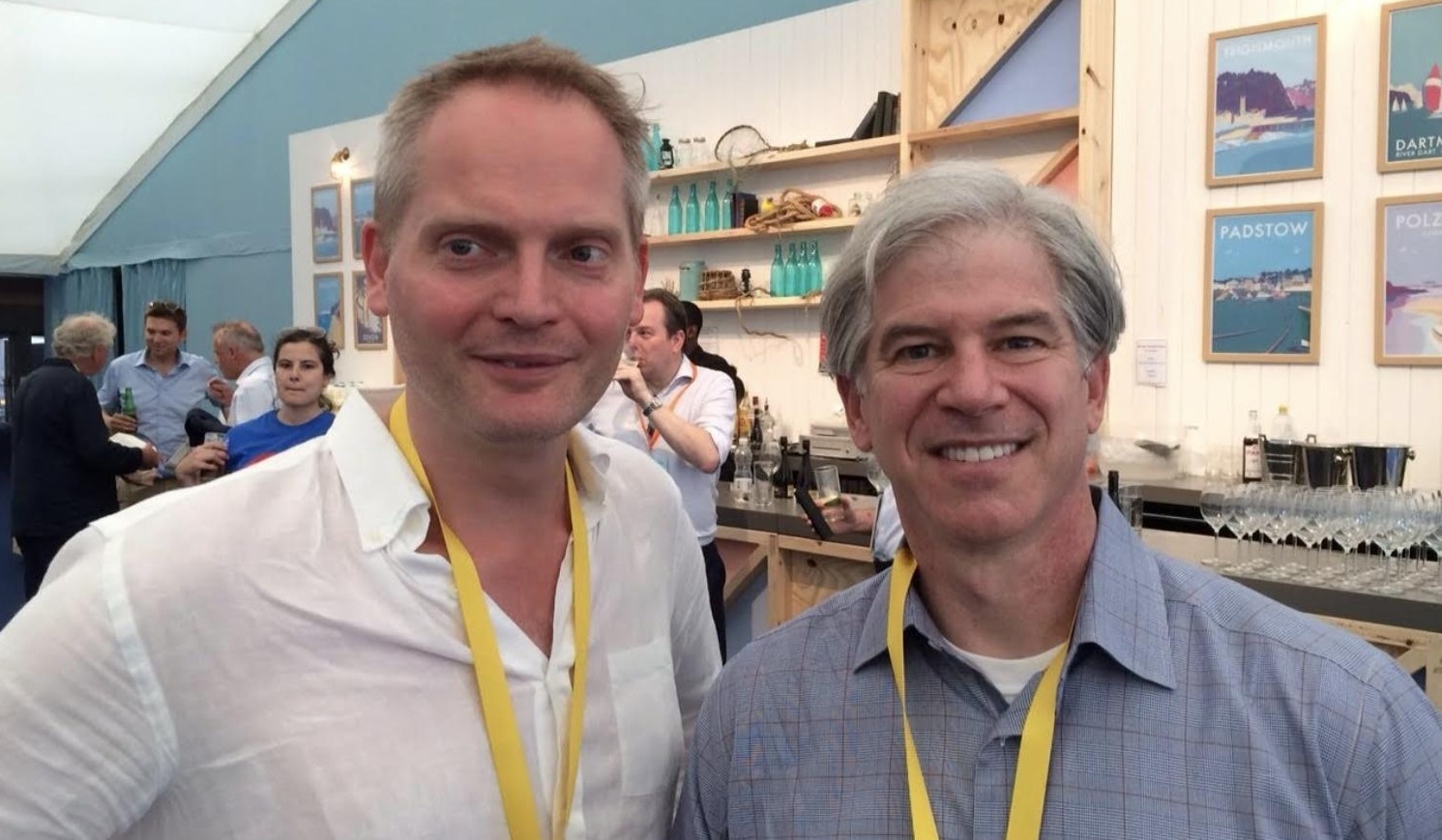
There’s not much money in podcasts - that we all know. And where there is money to be made - it’s the US. We need to find out why, and if that’ll change.
According to the most recent PwC Media Outlook report, the US Podcasting advertising market is estimated to be $1.8bn, compared to just $60m in the UK, $50m in both Canada and Australia, and $2m in tiny New Zealand.
If we splice these estimates with the latest Infinite Dial survey, and divide revenue by weekly reach of listeners - which ranges from 89m in the US to 14m in the UK - we can get a comparative metric: ‘revenue given reach’.
Think about it this way: if we know the US audience and ad revenue, we can look at four smaller English-speaking ‘commonwealth’ markets and work out what they should be worth if they kept pace with the US. Then, by comparing this to their actual reported revenue figures, we can measure the gap.
Let’s walk you through a UK example

Here’s an example. If the UK podcasting ad market matched the US’s revenue-given-reach figure, it would have generated $279mn in ad revenue last year. Instead, it generated only $60mn. Put another way, the UK podcasting ad market is just over a fifth (22%) of the size it should be. Australia (37%), Canada (32%) and New Zealand (7%) likewise lag behind.
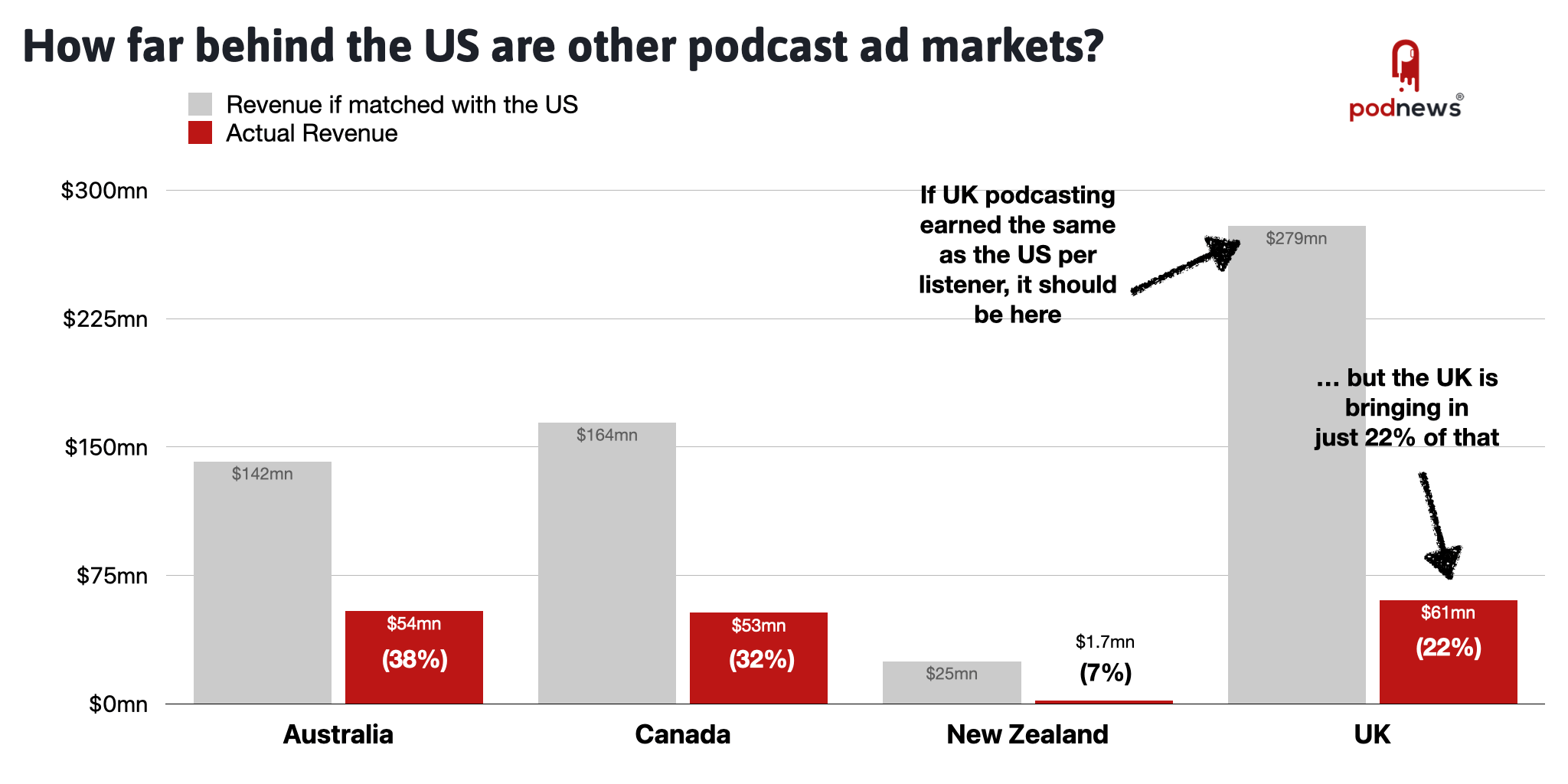
Source: PWC, Edison Infinite Dial, Podnews, Will Page
The US is a first mover and far ahead in the development of its podcasting ad market, in absolute and relative terms. Will the rest of the pack catch up, or will the US break even further away?
How does ad-funded music compare?
We can see a similar gap in the ad-funded music streaming market. Given that music has had more time to mature, you might expect to see more convergence than in podcasts. And there is: but only a little. Simply dividing each country’s ad-funded music revenues by their addressable markets, Australia’s market is 49% of the US’s, followed by Canada (41%), New Zealand, and the UK (both 34%).
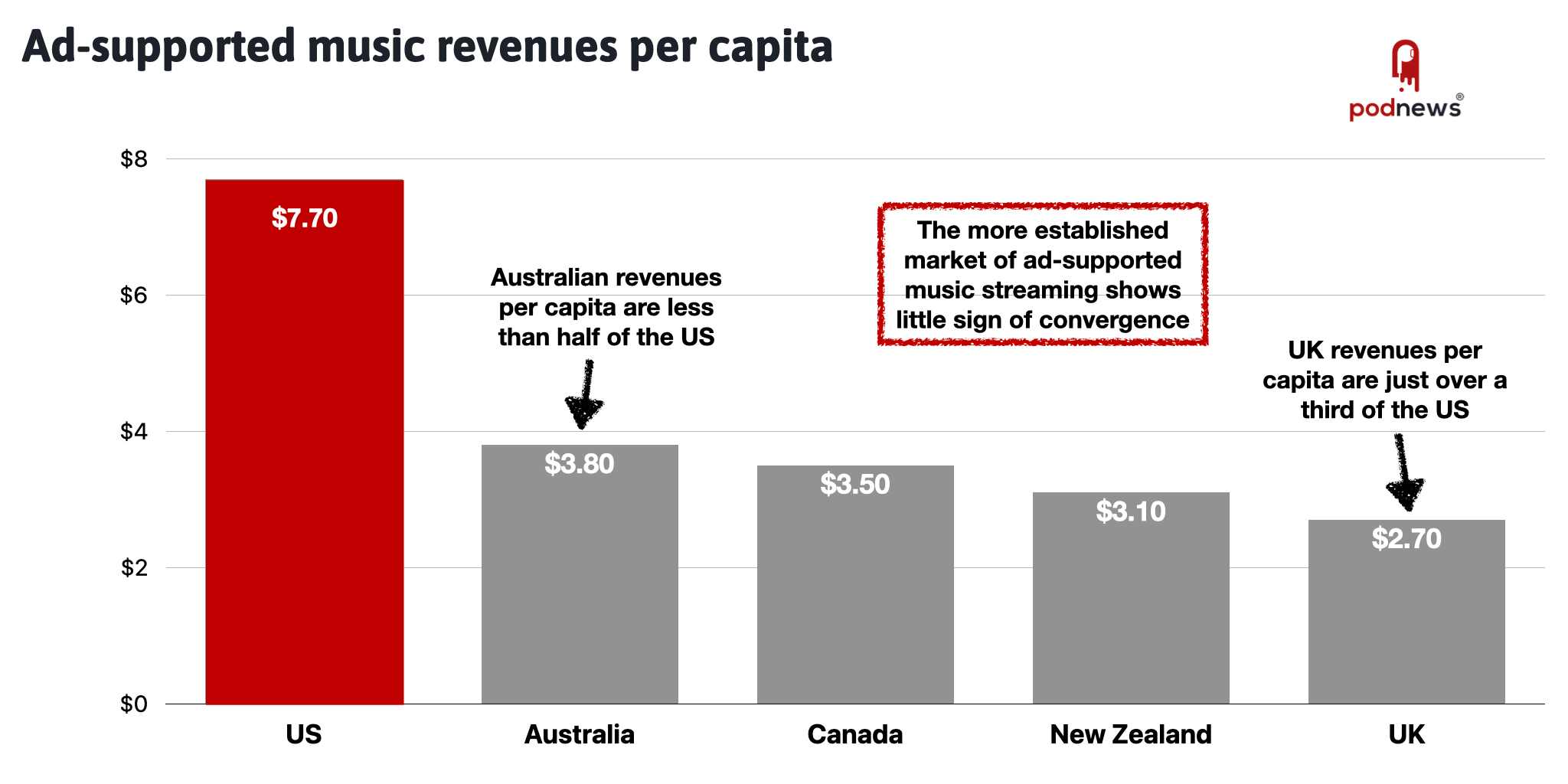
Sources: IFPI and OMDIA
There are three possible causal explanations for this: (i) America’s first mover advantage; (ii) the Commonwealth’s public service broadcasting dynamic and; (iii) a peculiarity in the purpose of advertising. Let’s unpack each of these.
The US’s First Mover Advantage
The United States got there first. The licensing body SoundExchange was founded in 2003, enabling a scalable radio-like webcasting industry, with players like Pandora and SiriusXM, that can’t be rivalled anywhere else in the world. Under the successful leadership of their CEO Michael Huppe, SoundExchange is regularly paying out $1bn to its members every year - and that’s pretty much all ad revenue from webcasters. The Commonwealth countries, by contrast, have no such webcasting industry.
By moving first, American advertisers were able to establish the bedrock infrastructure to allocate their media budgets to webcasting. Arguably, it’s a short hop skip and jump to allocate some of that to podcasting.
Another reason to mind the gap is that some of the biggest US podcasts do not sell advertising effectively in these other countries. That said, iHeartMedia and Global signing a multi-year partnership in the UK, Ireland and USA may help change that.
Crowding Out by Public Service Broadcasters
Let’s turn to cause number two. When policy wonks debate public service broadcasting (PSB), two terms get amplified: ‘crowding in’ and ‘crowding out’. The former suggests that broadcasters help raise the bar in the quality of radio and television output. The latter argues they preempt market activity that would have otherwise taken place. Might the commonwealth’s PSBs crowd out podcast advertising?
Podnews’s Editor, James Cridland, points to the BBC - for example - arguing that its radio output is listened-to by 31.6mn adults in the UK, 56% of the population. (NPR only reaches 23.5mn adults in the US, just 9% of the population). The Brits pay £159 a year (US $200) to access a lot of commercial-free, on-demand and offline content that risks crowding out the scarce attention market for advertisers; arguably conditioning the British public to treat commercial advertising as more intrusive.
Elsewhere, Australia has its own ABC, a behemoth in podcasting. The same is true for New Zealand’s RNZ. Ditto Canada’s CBC, which crowds out others in Triton’s Ranker, and has collaborated with the BBC. If, say, 25% of the popular podcast output across these markets is being created free of commercials, that may well crowd out advertising from the industry.
A peculiarity about the purpose of advertising
Finally, it’s worth interrogating the purpose of advertising - is it a friend or foe of the listener? For Spotify, advertising is arguably a strategic deterrent - a means to an end, as the greatest incentive for listeners to pay for premium is to get rid of the pesky ads. Notably, the opposite holds for newspapers. Should you subscribe to The Times - be it US or UK - you can expect to be flooded with adverts as part of the premium experience.
As for the podcast industry, we’re at a fork in the road. Many of the top shows, like the brilliant Kermode & Mayo’s Take, are successfully exploring subscription models; while platforms like Amazon are promoting ad-free podcasts for a subscription fee. So, are premium podcasts to come with or without adverts? Either way, these are confusing signals for media planners - is podcasting advertising a means to an (subscription) end or an end game in itself?
Ross Adams, CEO of Acast, views the role of ads as more of a quid pro quo for listeners, where "you give me this awesome show every week for free, and in return we hear ads”. He also points to Acast’s partnership with Patreon as a novel way to drive subscription, where the podcaster is empowered to choose the subscription platform to use on top of the(ir) Acast platform.
Our podcast industry is still finding its feet. However, we risk ‘widening the gap’ in podcasting’s global fortunes if we treat advertising as a deterrent meant to drive subscriptions. In a nod to both Adam Buxton and Conan O’Brien’s hilarious sponsored ads - where listeners passionately demand repeats of their inimitable ad-reads - it does no harm for this nascent industry to assume they can coexist.
Listen
Magnificent Noise x Richard Kramer x Will Page
Play trailer

